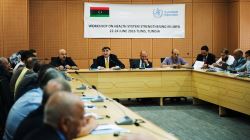 28 June 2016 – The WHO country office in Libya held a workshop in Tunis on health system strengthening in Libya from 22 to 24 June. The objectives of the workshop were to:
28 June 2016 – The WHO country office in Libya held a workshop in Tunis on health system strengthening in Libya from 22 to 24 June. The objectives of the workshop were to:
- take stock of the current situation vis-à-vis health system development needs and opportunities
- identify challenges, opportunities and priorities in service delivery, health care financing, health workforce development, health information system, essential medicine and technology and disaster management
- agree on next steps (major interventions) to strengthen health system in Libya
- define the roles and contributions of different stakeholders, mainstreaming the available capacities of institutions in Libya
- explore and agree on WHO technical cooperation/support needed to implement the agreed upon interventions.
The workshop was attended by senior level health experts from the Ministry of Health of Libya, representatives of academia and civil society organizations, as well as representatives from the United Nations Development Programme, United Nations Population Fund, United Nations Support Mission in Libya and the European Union. The workshop highlighted the importance of addressing key health system gaps in the 6 health system blocks and identifying opportunities for dealing with emergencies.
The workshop encouraged strategic thinking for agreement on key strategic actions which are achievable in this biennium and transcend political divisions for health to act as a bridge between different political groups. WHO staff from the Regional Office working in health systems, emergencies and information, evidence and research facilitated the 3-day workshop.
Representatives of the European Union also provided information about the revival of the LHSS project in health systems which caters for 4 health system blocks (governance, financing, service delivery, human resources for health). The European Union will be supporting WHO for the remaining 2 health system blocks (health information systems and pharmaceuticals and technologies). Both projects should work in unison so that health system synergies are synchronized to the maximum.
The United Nations Development Programme presented the stabilization facility introduced to rehabilitate health infrastructure and provide life-saving equipment in certain geographical areas in Libya. After an extensive discussion during different groups, key actions in all the health system blocks, as well as emergencies were identified.
It was agreed that health system actions at this juncture should be strategic and inform early recovery and reforms and should translate into more long-term reforms once the country returns to normalcy. The workshop concluded with the development of a road map and identified priority areas for collaboration between the Ministry of Health and WHO with well-defined roles and responsibilities, time-frames and short-, medium- and long-term goals.


